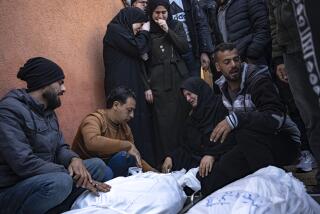Amid a Kidnapping, Silence
- Share via
BAGHDAD — Everyone stayed quiet.
The gunmen ordered witnesses to stand aside and remain still Saturday afternoon as they dragged the shopkeeper known as Abu Ammar away. The victim didn’t say a word, though he squirmed and tried to break free.
“Stay where you are,” one of the gunmen, a cleanshaven man in his 20s wearing a black bulletproof vest and holding an assault rifle, quietly told the frozen passersby. “Don’t move.”
The eight plainclothes kidnappers didn’t even raise their voices when one of them smashed the shopkeeper’s bespectacled face with the butt of an assault rifle. They shooed away a shop employee beseeching them to take along a small plastic bag, possibly filled with the 50-ish victim’s medicines, stuffed him into one of two white sport utility vehicles without license plates and drove away from the Colors stationery shop.
Drivers watching from their cars turned their heads and continued on their way. Pedestrians took hold of their loved ones and proceeded with their errands.
It was business as usual in Iraq, where at least 81 people were killed or found slain Saturday around the country.
The victim at the two-story shop, known for its high quality, wide selection and pricey wares, probably was the target of a kidnapping for ransom.
In Baghdad alone, police discovered the bodies of 51 gunshot victims, some killed on the streets and others abducted, blindfolded and brutalized before being shot and dumped in desolate lots.
The 3 p.m. kidnapping was pulled off in central Baghdad’s Karada neighborhood, one of the city’s safest, less than a mile from military forces stationed in the Green Zone and a few hundred yards from Iraqi police checkpoints and the armed security details of political parties and Western contractors.
It put on view the enormous challenge of restoring security to a country coming undone by multiple layers of violence.
Iraqi sports fans Saturday were mourning Nasser Shamil, the 37-year-old former captain of the Iraqi volleyball team, who was shot and killed Thursday night at his goldsmith shop in a Sunni neighborhood in western Baghdad.
Among the 51 bodies found in Baghdad, two were fished out of the Tigris River, both with bullet wounds to the head and signs of torture. An additional five, found blindfolded, handcuffed and shot execution-style, were discovered in a dump 10 miles east of the capital.
At least two more Iraqis were killed by roadside bombs aimed at passing Iraqi police and U.S. vehicle convoys.
To stanch the capital’s violence, Prime Minister Nouri Maliki last week announced the creation of neighborhood security committees composed of community leaders. But the plan remains on the drawing board and has yet to be put into practice, politicians said.
“Nothing is concrete now,” said Salim Abdullah Jabouri, a spokesman for the main Sunni Arab parliamentary bloc. “Everything is on paper.”
U.S. and Iraqi officials struggled to contain violence beyond the capital. A car bomb targeting an army checkpoint in the northern city of Tall Afar killed 14 Iraqis and injured 13.
At least three people were killed and three injured in mortar and bomb attacks in the mostly Shiite city of Hillah, south of Baghdad. Clashes between police and insurgents in downtown Samarra, north of the capital, led to the deaths of two officers and a child caught in the crossfire.
Iraqi police and soldiers, supported by U.S. Army troops and helicopters, intensified operations in several hot spots around the country. More than 14,000 soldiers and police officers sealed off the gritty northern oil city of Kirkuk before conducting house-to-house sweeps in search of weapons and suspected insurgents.
The crackdown has prevented residents from shopping for food during Ramadan, the Muslim holy month of daytime fasting.
“The puzzle in all this is that we do not know when it will be over,” said Nozad Qadir, a Kirkuk resident.
Iraqi soldiers launched raids in the religiously and ethnically mixed province of Diyala, northeast of Baghdad, killing at least four suspected insurgents. The bodies of four victims of apparent sectarian violence were discovered in different parts of Baqubah, the provincial capital.
Special correspondents in Baghdad, Baqubah, Hillah, Kirkuk, Mosul and Samarra contributed to this report.
More to Read
Sign up for Essential California
The most important California stories and recommendations in your inbox every morning.
You may occasionally receive promotional content from the Los Angeles Times.











